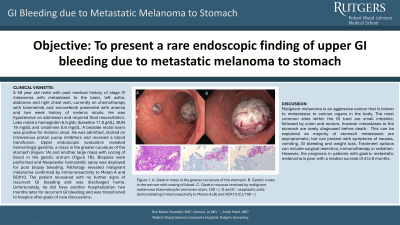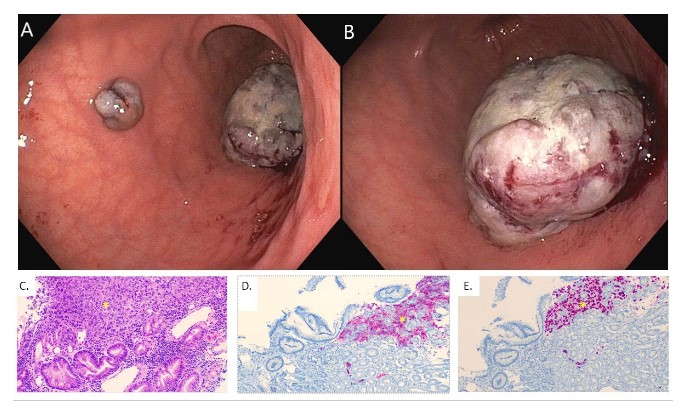Tuesday Poster Session
Category: GI Bleeding
P4203 - GI Bleeding Due to Metastatic Melanoma to the Stomach
Tuesday, October 29, 2024
10:30 AM - 4:00 PM ET
Location: Exhibit Hall E

Has Audio

Toni Chandler, MD
Robert Wood Johnson Medical School, Rutgers University
New Brunswick, NJ
Presenting Author(s)
Toni Marie Chandler, MD, Samuel Y. Jo, MD, Anish V. Patel, MD, Isago Jerrett, MD, Sarag Boukhar, MD
Robert Wood Johnson Medical School, Rutgers University, New Brunswick, NJ
Introduction: We present a case of upper gastrointestinal (GI) bleeding due to metastatic melanoma to the stomach.
Case Description/Methods: A 59 year old male with past medical history of stage IV melanoma with metastases to the brain, left axilla, abdomen and right chest wall, currently on chemotherapy with binimetinib and encorafenib presented with anemia and two week history of melenic stools. He was hypotensive on admission and required fluid resuscitation. Labs noted a hemoglobin 6.5 g/dL (baseline 11.0 g/dL), BUN 19 mg/dL and creatinine 0.6 mg/dL. A bedside rectal exam was positive for melenic stool. He was admitted, started on intravenous proton pump inhibitors and received a blood transfusion. Upper endoscopic evaluation revealed hemorrhagic gastritis, a mass in the greater curvature of the stomach (Figure 1A) and another large mass with oozing of blood in the gastric antrum (Figure 1B). Biopsies were performed and Nexpowder hemostatic spray was deployed for post biopsy bleeding. Pathology revealed malignant melanoma (Figure 1C) confirmed by immunoreactivity to Melan-A and SOX10 (Figure 1D and 1E). The patient recovered with no further signs of recurrent GI bleeding and was discharged home. Unfortunately, he did have another hospitalization two months later for recurrent GI bleeding and was transitioned to hospice after goals of care discussions.
Discussion: Malignant melanoma is an aggressive cancer that is known to metastasize to various organs in the body. The most common sites within the GI tract are small intestine, followed by colon and rectum, however metastases to the stomach are rarely diagnosed before death. This can be explained as majority of stomach metastases are asymptomatic, but can present with symptoms of nausea, vomiting, GI bleeding and weight loss. Treatment options can include surgical resection, immunotherapy or radiation. However, the prognosis in patients with gastric metastatic melanoma is poor with a median survival of 4 to 6 months.

Disclosures:
Toni Marie Chandler, MD, Samuel Y. Jo, MD, Anish V. Patel, MD, Isago Jerrett, MD, Sarag Boukhar, MD. P4203 - GI Bleeding Due to Metastatic Melanoma to the Stomach, ACG 2024 Annual Scientific Meeting Abstracts. Philadelphia, PA: American College of Gastroenterology.
Robert Wood Johnson Medical School, Rutgers University, New Brunswick, NJ
Introduction: We present a case of upper gastrointestinal (GI) bleeding due to metastatic melanoma to the stomach.
Case Description/Methods: A 59 year old male with past medical history of stage IV melanoma with metastases to the brain, left axilla, abdomen and right chest wall, currently on chemotherapy with binimetinib and encorafenib presented with anemia and two week history of melenic stools. He was hypotensive on admission and required fluid resuscitation. Labs noted a hemoglobin 6.5 g/dL (baseline 11.0 g/dL), BUN 19 mg/dL and creatinine 0.6 mg/dL. A bedside rectal exam was positive for melenic stool. He was admitted, started on intravenous proton pump inhibitors and received a blood transfusion. Upper endoscopic evaluation revealed hemorrhagic gastritis, a mass in the greater curvature of the stomach (Figure 1A) and another large mass with oozing of blood in the gastric antrum (Figure 1B). Biopsies were performed and Nexpowder hemostatic spray was deployed for post biopsy bleeding. Pathology revealed malignant melanoma (Figure 1C) confirmed by immunoreactivity to Melan-A and SOX10 (Figure 1D and 1E). The patient recovered with no further signs of recurrent GI bleeding and was discharged home. Unfortunately, he did have another hospitalization two months later for recurrent GI bleeding and was transitioned to hospice after goals of care discussions.
Discussion: Malignant melanoma is an aggressive cancer that is known to metastasize to various organs in the body. The most common sites within the GI tract are small intestine, followed by colon and rectum, however metastases to the stomach are rarely diagnosed before death. This can be explained as majority of stomach metastases are asymptomatic, but can present with symptoms of nausea, vomiting, GI bleeding and weight loss. Treatment options can include surgical resection, immunotherapy or radiation. However, the prognosis in patients with gastric metastatic melanoma is poor with a median survival of 4 to 6 months.

Figure: Figure 1. A. Gastric mass in the greater curvature of the stomach. B. Gastric mass in the antrum with oozing of blood. C- Gastric mucosa involved by malignant melanoma (haematoxylin and eosin stain, 100 ×). D and E- neoplastic cells demonstrating immunoreactivity to Melan-A (B) and SOX10 (C) (100 ×).
Disclosures:
Toni Marie Chandler indicated no relevant financial relationships.
Samuel Jo indicated no relevant financial relationships.
Anish Patel indicated no relevant financial relationships.
Isago Jerrett indicated no relevant financial relationships.
Sarag Boukhar indicated no relevant financial relationships.
Toni Marie Chandler, MD, Samuel Y. Jo, MD, Anish V. Patel, MD, Isago Jerrett, MD, Sarag Boukhar, MD. P4203 - GI Bleeding Due to Metastatic Melanoma to the Stomach, ACG 2024 Annual Scientific Meeting Abstracts. Philadelphia, PA: American College of Gastroenterology.
